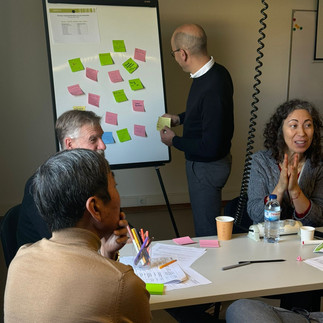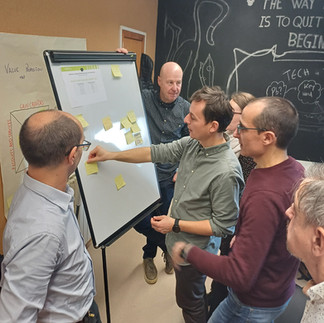NYMPHE 5th General Assembly – summary of the consortium meeting
- Nymphe

- Jan 27, 2025
- 2 min read
This time, the NYMPHE Consortium gathered in Portugal at the University of Aveiro. Every six months, our team comes together to share updates on the project’s progress and achievements, discuss challenges, and plan the road ahead.
The meeting began with a warm welcome from Joana Pereira of the University of Aveiro, followed by opening remarks from our project coordinator, Giulio Zanaroli of the University of Bologna. Giulio also presented feedback from the latest Evaluation Report, paving the way for further discussions.
Day 1: Progress and Technical Insights
The first day’s sessions focused on key areas of bioremediation, with updates and developments in:
Selection and characterization of biologics.
Design and performance evaluation of assemblies at the lab scale.
Testing these systems at the pilot scale (ongoing and planned).
Day 2: Workshop and Stakeholder Engagement
The second day began with a dynamic and interactive workshop for consortium members. The focus was on developing actionable strategies to effectively engage stakeholders and local communities. The primary goal of this session was to collaboratively create an Action Plan tailored to stakeholders at the project’s pilot sites.
The workshop sparked lively debates as partners addressed critical questions:
What do we aim to achieve?
Who are the key stakeholders in each region?
How do we plan to engage them effectively?
This energizing session clarified priorities, highlighted the partners' needs, and strengthened a shared vision for maximizing stakeholder engagement to enhance the project's impact. Discussions revolved around the stakeholders most crucial to the five contaminated pilot sites where NYMPHE methods will be implemented.
Pilot sites include:
Industrial site – Ferrara Province, Italy
Hyporheic zone (HZ) – Erpe River, Hoppegarten, Germany
Agricultural field – Falassarna, Western Crete, Greece
Municipal wastewater treatment site – Alcalá, Spain
Facility for confined use of bioengineered biologics – Leopoldov, Slovak Republic
After a short break, the meeting continued with partner presentations. These sessions provided updates on achievements, deliverables, and current needs, with a particular focus on:
Developing a toolbox for improving biologics.
Testing enhanced biologics in systems.
Conducting holistic assessments of bioremediation strategies and technologies.
Additionally, the consortium reviewed the current status of communication, dissemination, and exploitation activities, along with plans for the next steps in these critical areas.
EU Feedback and Next Steps
This meeting was particularly significant as the consortium addressed feedback and recommendations from the EU Project Officer, based on the technical report. Discussions focused on integrating these recommendations into the next phases of the project to ensure alignment with NYMPHE’s objectives and long-term vision.
Closing Reflections
The NYMPHE 5th General Assembly marked another important stop in the Nymphe project’s journey. These regular consortium meetings are vital for streamlining efforts, fostering collaboration, and tackling challenges.
NYMPHE team is making steady progress toward its mission: developing innovative bioremediation technologies for a cleaner and more sustainable future.


















































Comments